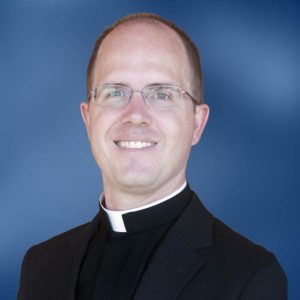The greatest gift anyone has ever received is forgiveness through Christ. The Sacrament of Reconciliation is a treasure that allows us to come back to the merciful embrace of the Father whenever we stray from Him through our sins. No matter what we have done, we can be forgiven. But what if we can’t forgive ourselves?
Recently on St. Joseph’s Workshop, Fr. Matthew Spencer, OSJ responded to a listener who asked how we can forget the sins of our past even after we have confessed them. Fr. Matthew said:
“First of all, I think we have to remember who God is. God is love. And God’s love is manifest to us in His mercy. Jesus said to St. Faustina that God’s greatest attribute is His mercy. Even greater than His justice, is His mercy.
God wants to forgive you so badly. God wants you to not experience separation from Him so badly that He sent His only Son to die on the Cross. And He would have done it only for you. Of course, He did it for every single one of us. The sacrifice of Jesus on the Cross has infinite value, so it can be applied to all of us. The greatest of sinners, and still there is grace that abounds.
So the first realization that we have to remind ourselves of is that God is mercy itself. And if we think that somehow there is some sin that is so grave that God’s mercy can’t cover, that God’s mercy can’t handle it – then that’s just theologically wrong. 
Jesus, communicating to St. Faustina, said, ‘Your sins are like a drop in the ocean of My mercy.’ It’s unfathomable to us how gracious, how grand, how generous God’s mercy is. Sometimes, though, we find ourselves struggling with scrupulosity. We find ourselves struggling with our own guilt to such a degree that we just don’t believe it.
So what do you do? Is the solution to forget about those sins? And how do we do that? Well, here is the important thing. Where in Scripture does it say to forget those sins? Where in the Catechism does it say that when you go to Confession those sins will be forgotten in your mind?
See, the goal of Confession and the goal of forgiveness in your life is not just to forget those sins, but to submit those sins to the mercy of God. You might hang on to those sins in your memory. You might remember those grave sins that have plagued you for a long time. But as soon as you begin to immerse them in God’s mercy, you begin to realize that you are not a slave to that guilt anymore. You’re not a slave to the effect of those sins anymore.
And if you’re still feeling enslaved to those sins, to me it is an indicator that you haven’t yet opened up that fount of God’s mercy in the sacrament. You haven’t yet realized how merciful God is.
Of course God wants you to feel sorrow for your sins. Of course He wants us to recognize, sometimes, even how grave those sins were. But He also wants healing for your heart.
God doesn’t want you to continually suffer through life, unless it leads you to become a great saint. God isn’t out there looking to try to inflict pain and suffering on you because you committed some grave sin in the past. He might allow you to suffer, and He might allow you to go through pain – but it’s only to lead you to a deeper relationship with Him. To lead you to greater holiness.
So while I would say that, sometimes, when we think about our sins, and we recognize that remorse and sorrow that’s there, it can be a penance, it can have an effect on us that is a healing effect. Because it will remind me that I better not sin like that again in the future. It hurt me so badly, it affected me so deeply, and it harmed me so personally that I am not going to ever turn back.
For that reason, God will oftentimes allow us to remember our sins. God will oftentimes allow our sins to remain in our lives and in our minds. But He wants us to look at those sins through His mercy. Not to carry them around as a weight, as if we’re the ones carrying the Cross of Christ. We’re not.
In my opinion, forgetting your sins is not a reasonable goal. It’s not what we should expect. And it’s not even what God wants from us anyway. Instead, what God wants us to do is to live in the present moment. To recognize that in His love and in His mercy there is healing. And He wants us truly, truly to live anew.”
Listen to the full reflection below:
St. Joseph’s Workshop with Father Matthew Spencer airs weekdays at 7:00 p.m. Eastern/4:00 p.m. Pacific on Relevant Radio®.


